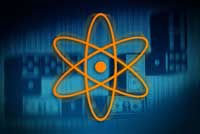Apr 8 2008
Your computer has two equally important elements: computing power and memory. Traditionally, scientists have developed these two elements in parallel. Computer memory is constructed from magnetic components, while the media of computing is electrical signals. The discovery of the scientists at University of Copenhagen, Jonas Hauptmann, Jens Paaske and Poul Erik Lindelof, is a step on the way towards a new means of data-storage, in which electricity and magnetism are combined in a new transistor concept.

Jonas Hauptmann, PhD student, has carried out the experiments under supervision of Professor Poul Erik Lindelof. Jonas Hauptmann says, "We are the first to obtain direct electrical control of the smallest magnets in nature, one single electron spin. This has vast perspectives in the long run. In our experiments, we use carbon nanotubes as transistors. We have placed the nanotubes between magnetic electrodes and we have shown, that the direction of a single electron spin caught on the nanotube can be controlled directly by an electric potential. One can picture this single electron spin caught on the nanotube as an artificial atom."
Direct electrical control over a single electron spin has been acknowledged as a theoretical possibility for several years. Nevertheless, in spite of many zealous attempts worldwide, it is only now with this experiment that the mechanism has been demonstrated in practice. This is why the discovery of the scientists has attracted a lot of interest.
Professor at Nano-Science Center and the Niels Bohr Institute, Jens Paaske, has been in charge of the data analysis. Jens Paaske says, "Transistors are important components in every electronic device. We work with a completely new transistor concept, in which a carbon nanotube or a single organic molecule takes the place of the traditional semi-conductor transistor. Our discovery shows that the new transistor can function as a magnetic memory."